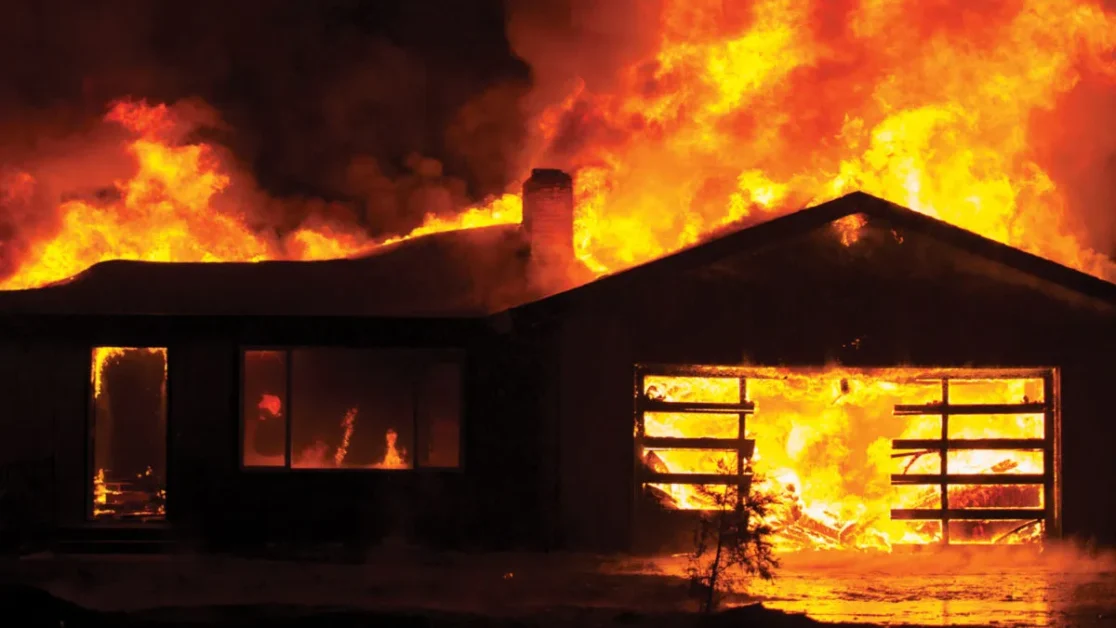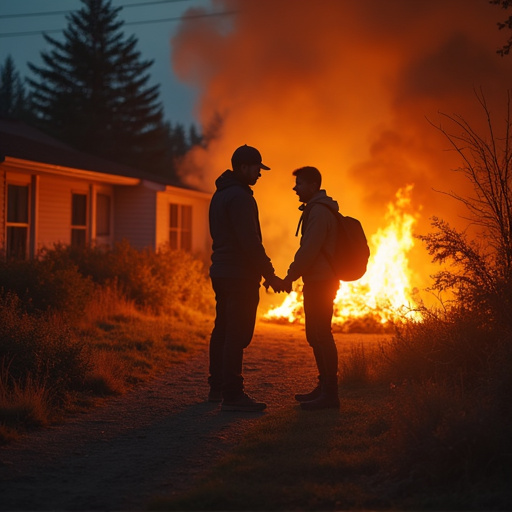How to Handle Payments and Obligations After an Apartment Fire: A Comprehensive Guide
When your apartment burns down, you’re suddenly faced with numerous financial and legal obligations, particularly concerning your landlord and rental payments.
This guide explores the essential steps to take, your rights and responsibilities, insurance matters, and how to navigate the complex aftermath of an apartment fire while maintaining a proper relationship with your landlord.

Understanding Your Initial Legal Position
The immediate aftermath of an apartment fire brings up critical legal questions about your continuing obligations to your landlord.
The first step is to review your lease agreement thoroughly, as it typically contains specific provisions about fire damage and habitability.
Most states have laws that address the rights and responsibilities of both tenants and landlords in case of fire damage.
The doctrine of “constructive eviction” may apply if the apartment becomes uninhabitable, which could release you from rent obligations.
However, this varies by jurisdiction. It’s crucial to document everything immediately after the fire, including taking photographs, saving all communication with your landlord, and keeping records of fire department reports.
This documentation will be vital for insurance claims and potential legal proceedings.
Consider consulting with a tenant rights attorney who can review your specific situation and advise on your legal standing, especially if there are disputes about payment obligations or security deposit returns.
Immediate Communication with Your Landlord

Establishing clear and documented communication with your landlord is crucial immediately following an apartment fire.
Start by notifying your landlord in writing about the fire, even if they’re already aware of it.
This formal communication should detail the extent of the damage and your immediate plans for temporary housing.
Use multiple communication methods – email for written records, followed by phone calls for immediate responses.
Document every interaction, including dates, times, and the content of conversations.
Be professional and cooperative, but also be clear about your expectations and needs.
Create a paper trail by sending follow-up emails summarizing any verbal conversations.
Share relevant information about the fire department’s investigation and any preliminary findings.
Remember to keep copies of all communications in a safe place, preferably both digital and physical copies stored somewhere unaffected by the fire.
This documentation will be invaluable for insurance claims and protecting your rights.
Insurance Claims and Coverage

Understanding and navigating insurance claims is a critical step in addressing your financial obligations after an apartment fire.
First, review your renter’s insurance policy if you have one – it typically covers personal property damage, temporary housing costs, and liability protection.
Contact your insurance provider immediately to initiate a claim, and request a detailed explanation of your coverage and the claims process.
Document all damaged items through photographs and detailed lists, including approximate values and purchase dates.
If you don’t have renter’s insurance, investigate whether your landlord’s insurance policy offers any protection for tenants in fire situations.
Some landlord policies include provisions for tenant relocation assistance.
Keep all receipts for emergency expenses, temporary housing, and replacement items, as these might be reimbursable through insurance.
Work with your insurance adjuster to understand the timeline for claims processing and what documentation they need.
Remember that insurance claims can take time to process, so plan accordingly for immediate expenses.
Determining Rent Payment Obligations

The question of continuing rent payments after an apartment fire depends on several factors.
Generally, if the apartment is completely uninhabitable, you may be entitled to stop rent payments until repairs are completed or the lease is terminated.
However, this must be handled properly to avoid legal issues.
Review state and local laws regarding rent abatement in cases of fire damage.
Some jurisdictions require landlords to prorate rent from the date of the fire if the unit becomes uninhabitable.
If only part of the unit is damaged, you might negotiate a reduced rent payment while repairs are made.
Document the condition of the apartment and get written confirmation from the fire department or building inspector regarding habitability.
Don’t simply stop paying rent without proper legal justification and documentation.
If you continue paying rent, consider placing it in an escrow account until the situation is resolved.
This shows good faith while protecting your interests. Discuss payment arrangements with your landlord and get any agreements in writing.
Security Deposit Considerations

Managing your security deposit becomes a crucial concern after an apartment fire.
The fate of your deposit depends largely on the cause of the fire and your lease terms.
If the fire wasn’t caused by tenant negligence, you should be entitled to a full refund of your security deposit.
However, if you were responsible for the fire, the landlord might have grounds to withhold the deposit to cover damages.
Request a detailed inspection of the damaged property with your landlord, documenting the pre-existing condition versus fire damage.
Some states require landlords to either return the security deposit or provide a detailed explanation of any deductions within a specific timeframe, even in fire situations.
Keep records of the apartment’s condition before the fire through photographs or videos if available.
If disputes arise about the security deposit, consider mediation services or small claims court.
Understanding your state’s security deposit laws becomes especially important in fire situations, as they may provide specific protections for tenants.
Temporary Housing Solutions and Costs

Finding and financing temporary housing is an immediate concern after an apartment fire.
Your renter’s insurance may cover temporary housing costs through “loss of use” coverage, typically for a specified period or dollar amount.
Work with your insurance company to understand these benefits and how to access them quickly.
Research short-term housing options like extended-stay hotels, corporate housing, or short-term rentals.
Keep detailed records of all temporary housing expenses, including application fees, deposits, and monthly costs.
Some organizations provide emergency assistance for fire victims – contact local Red Cross chapters, religious organizations, and community assistance programs.
Consider negotiating with your landlord about applying your current rent payments toward temporary housing costs.
If working with insurance, understand the reimbursement process and what documentation is required.
Create a realistic budget for temporary housing that accounts for potentially higher costs than your regular rent.
Remember to factor in additional expenses like furniture rental or storage fees for salvaged belongings.
Documentation and Record Keeping

Maintaining thorough documentation is essential for protecting your interests and managing financial obligations after an apartment fire.
Create a comprehensive file system for all fire-related documents, including the fire department report, insurance claims, correspondence with your landlord, receipts, and photographs of damage.
Use digital storage solutions with backups to ensure important documents aren’t lost.
Keep a detailed timeline of events, including when the fire occurred, all communications, and actions taken.
Document all expenses related to the fire, including temporary housing, replacement items, and cleaning services.
Take photographs or videos of the damaged apartment and your belongings from multiple angles.
Maintain records of any fire investigation findings or reports from building inspectors.
Create an inventory of damaged personal property with estimated values and proof of ownership when possible.
Keep copies of all insurance correspondence and claim documentation.
This detailed record-keeping will be invaluable for insurance claims, legal proceedings, and tax purposes.
Negotiating with Your Landlord

Successfully negotiating with your landlord requires a strategic approach focused on finding mutually beneficial solutions.
Begin by clearly understanding your goals – whether it’s terminating the lease, securing temporary rent reduction, or ensuring proper repairs.
Prepare for negotiations by gathering all relevant documentation, including lease agreements, insurance information, and damage assessments.
Approach negotiations professionally and cooperatively, focusing on solutions rather than blame.
Consider involving a mediator if direct negotiations become difficult.
Present realistic proposals that acknowledge both your needs and your landlord’s concerns.
Get all agreements in writing, with specific terms, timelines, and responsibilities clearly outlined.
Be prepared to compromise while still protecting your rights.
If repairs are needed, discuss specific timelines and standards for completion.
Consider requesting regular progress updates and inspection opportunities during repairs.
Remember that maintaining a professional relationship with your landlord can help facilitate better outcomes for both parties.
Legal Assistance and Resources

Understanding when and how to seek legal assistance is crucial in navigating the aftermath of an apartment fire.
Consider consulting with a tenant rights attorney, especially if facing disputes over payments, deposits, or lease obligations.
Many communities offer free or low-cost legal aid services specializing in housing issues.
Research local tenant rights organizations that can provide guidance and resources.
Document all attempts to resolve issues with your landlord before seeking legal intervention.
Understand the difference between legal advice and general information – some situations require professional legal counsel.
Consider joining tenant rights groups or forums for support and information sharing.
Research your state’s landlord-tenant laws regarding fire damage and habitability requirements.
Keep records of any legal consultations or advice received. Some law schools offer free legal clinics that can provide assistance with housing issues.
Remember that legal action should typically be a last resort after attempting to resolve issues directly with your landlord.
Moving Forward and Future Planning

After managing the immediate aftermath of an apartment fire, focus on long-term planning and prevention strategies.
Consider purchasing more comprehensive renter’s insurance for future rentals, understanding coverage options better.
Document lessons learned from the experience to better prepare for future emergencies.
Create digital copies of important documents and store them in cloud-based systems for easy access.
Develop an emergency savings fund specifically for housing-related emergencies.
Research fire prevention measures and safety equipment for future residences.
Consider requesting regular safety inspections in future rental agreements.
Maintain an updated inventory of personal belongings with photographs and values.
Build relationships with local emergency services and community support organizations.
Keep important contact information readily available, including insurance agents, legal resources, and emergency services.
This preparation can help minimize financial impact and stress if facing similar situations in the future.
Final Thoughts
Navigating the financial obligations to your landlord after an apartment fire requires careful attention to legal rights, insurance coverage, and documentation.
While the process can be overwhelming, maintaining professional communication and understanding your rights and responsibilities will help guide you through this challenging situation.
Remember that resources and support are available to help you rebuild and move forward.